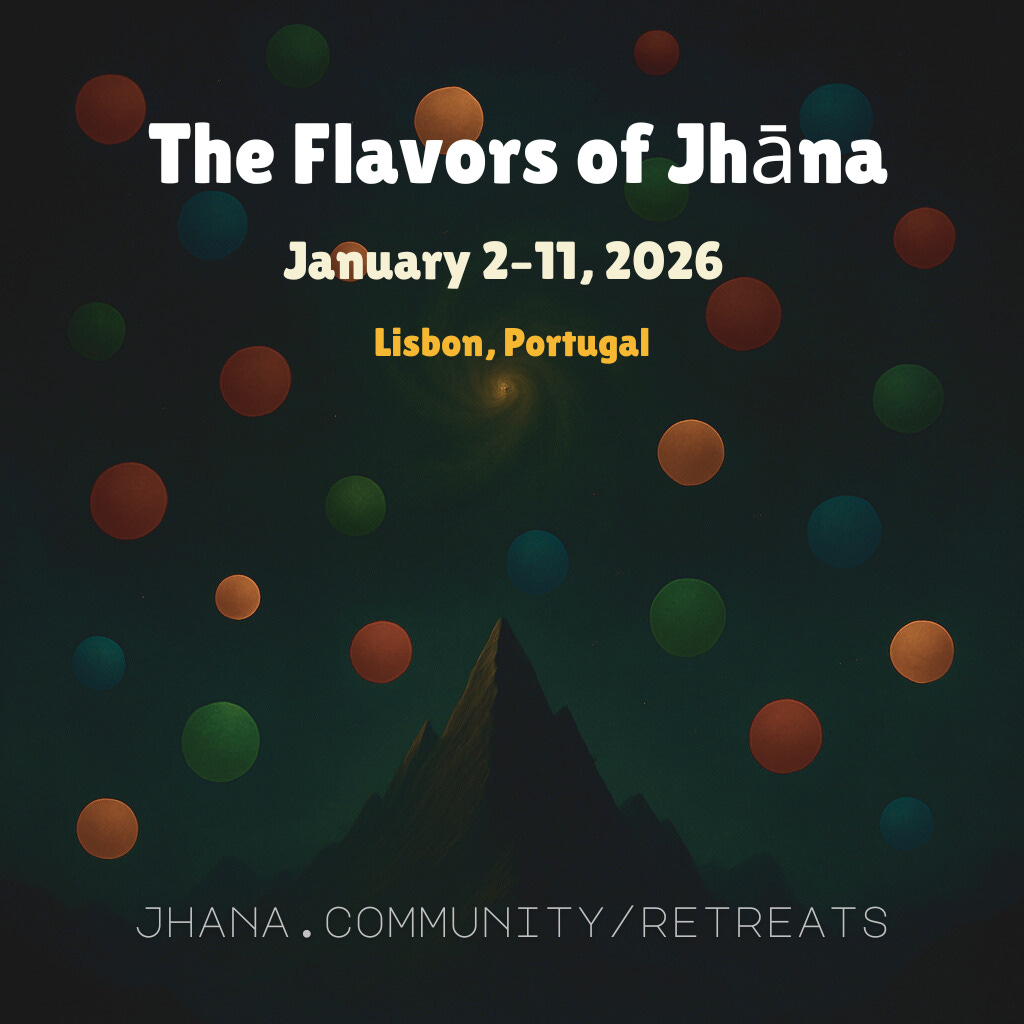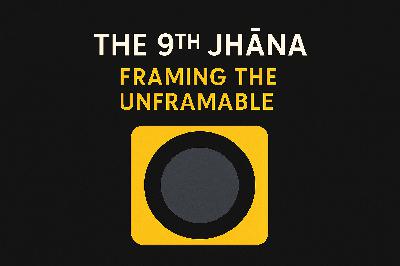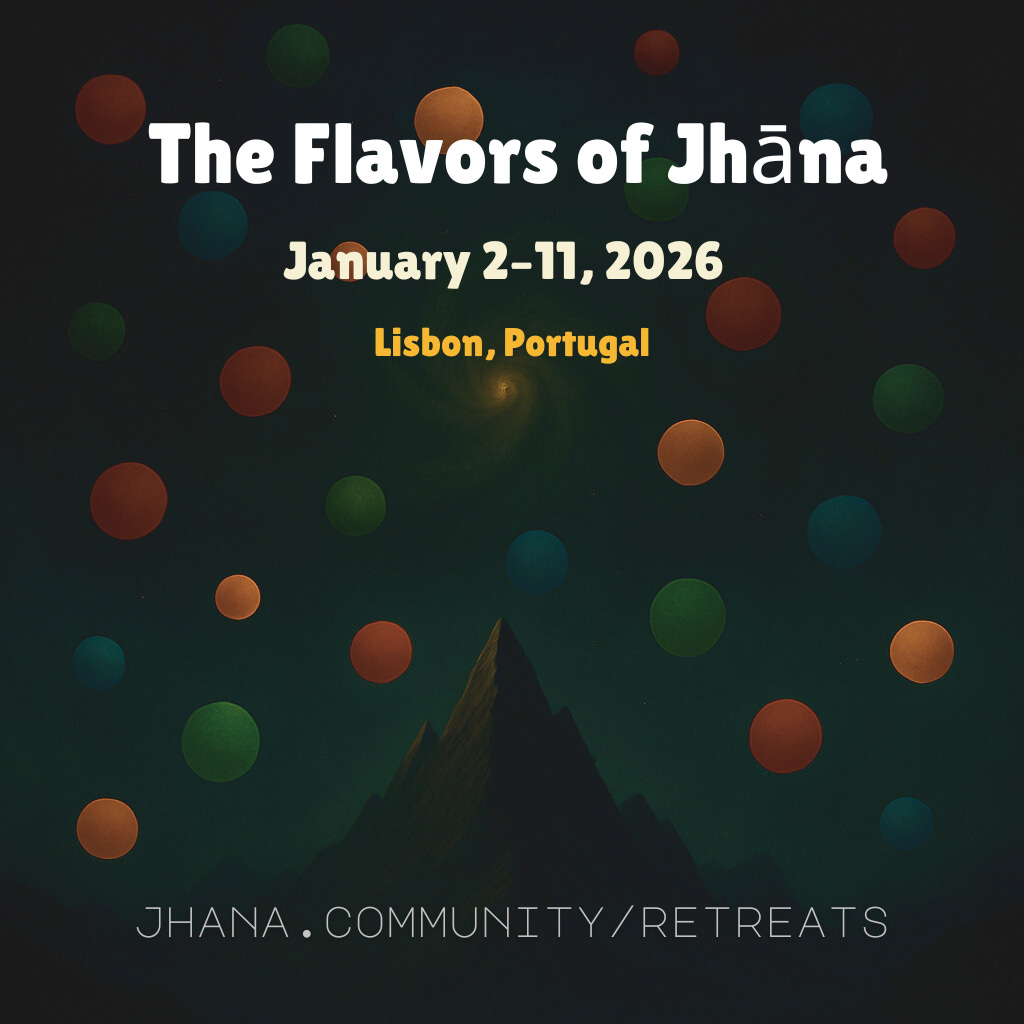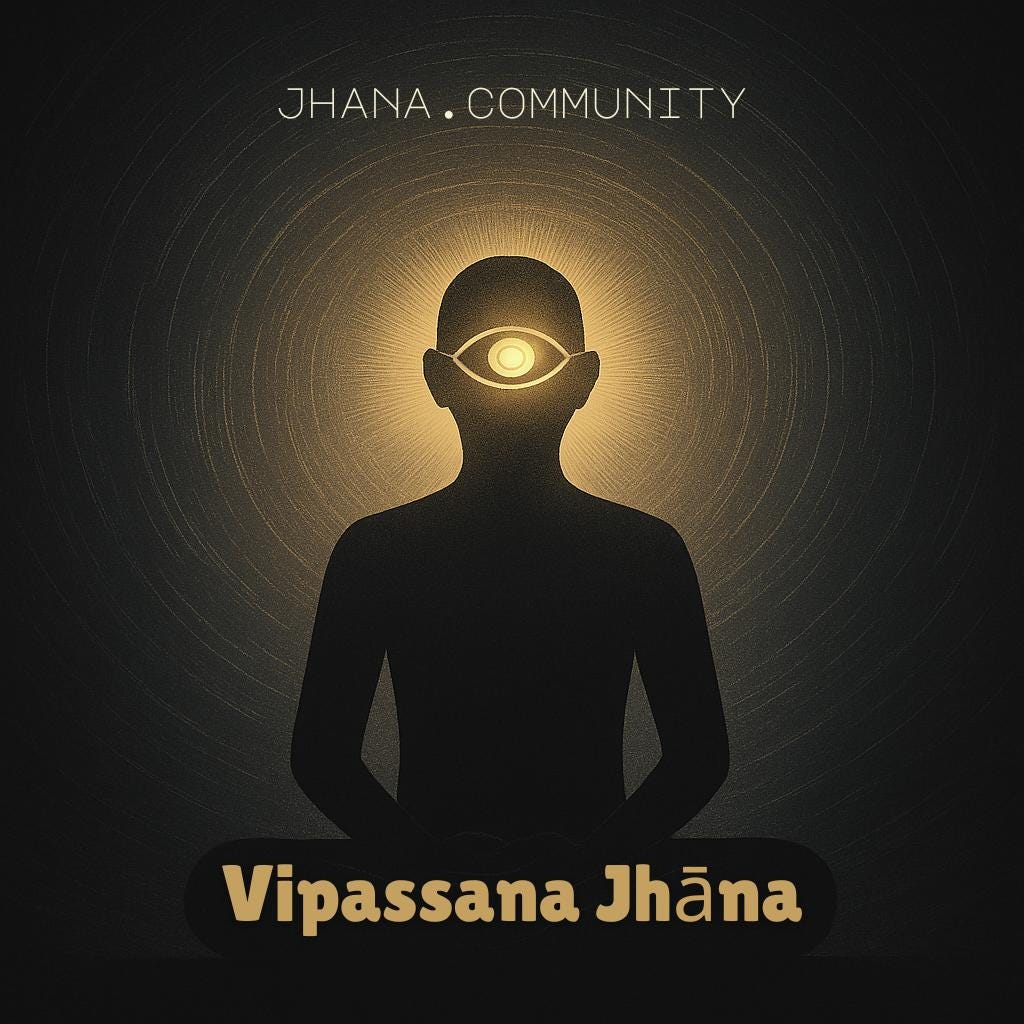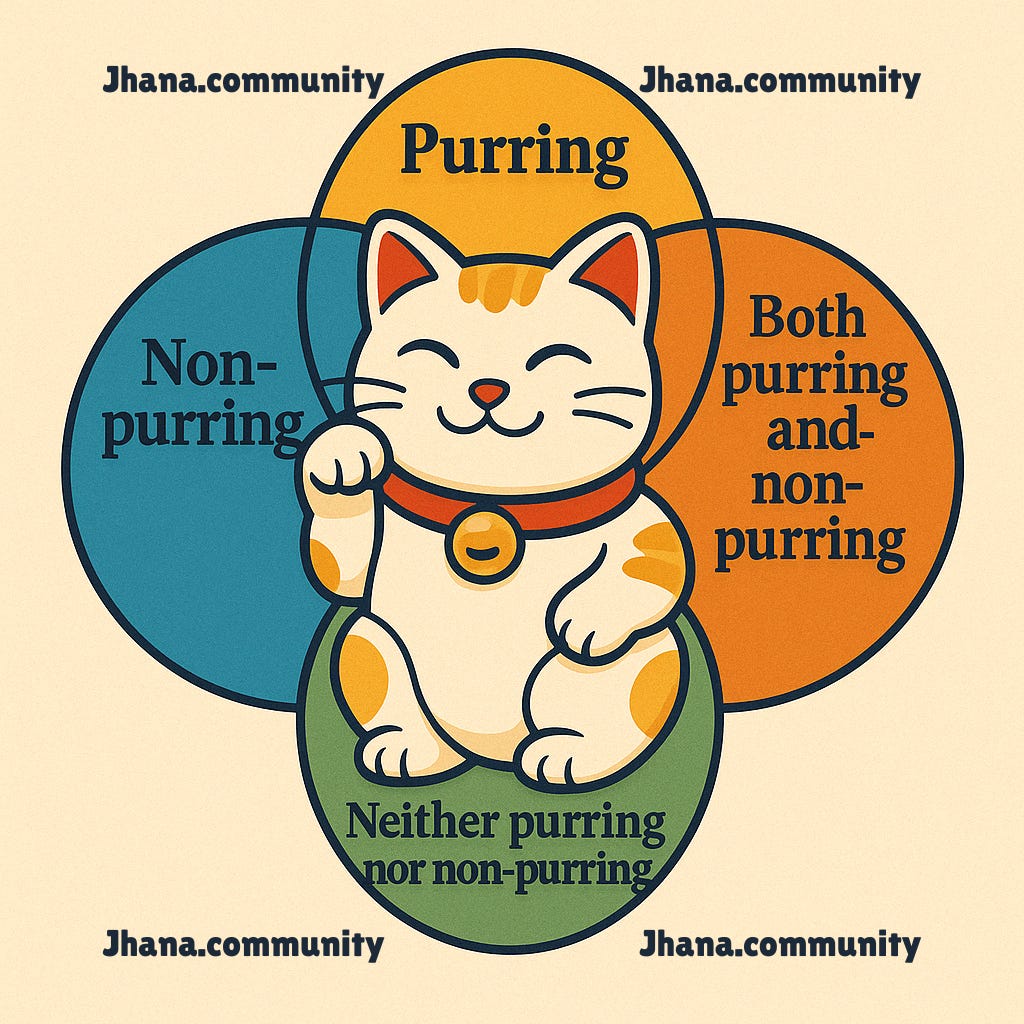The Flavors of Jhāna
Description
Vince Fakhoury Horn: The Flavors of Jhāna—I can’t remember where I first heard this term. I think it was from you or from Kenneth [Folk].
Brian Newman: Maybe we should start there. You came to me and said, “What should we call the retreat?” And I said, “Hey, you’re the one who wanted to do it in Portugal—what should we call it?” You threw it back at me, and I said, “Can we call it the name of my half-written book?”
So folks, this all comes from a story that’s part of a lineage. This is a Kenneth Folk story, and it’s his way of demonstrating Jhāna on the spectrum.
Kenneth says: imagine you’ve got a bunch of strawberries. You crush them into a strawberry smoothie, and you drink it. What does it taste like? A hundred percent strawberries.
Now imagine a glass of clear water. You take a strong strawberry extract in concentrated form, drop in a single drop. What does it taste like? Strawberry—but just one tiny drop.
And Kenneth’s punchline is, “It all tastes like strawberry, motherfucker.” His point is that it doesn’t matter where you are on the spectrum of Jhāna. On one end, you’ve got the Pa’auk tradition—completely absorbed, so much so that a gun could go off next to your head and you wouldn’t notice. On the lighter end, you’ve got Leigh Brasington, teaching Jhānic factors in a very Sutta-based way, or even lighter approaches. But Kenneth’s point is: it all tastes like Jhāna. Different flavor, same essence.
Even the tiniest drop in the ocean still tastes like strawberry. That’s how I understood the story when Kenneth told it.
Much of this dialogue centers around an upcoming 10-day meditation retreat on the same topic, The Flavors of Jhāna, that will be co-taught by Brian Newman & Vince Horn.
Vince: The Flavors of Jhāna—I can’t remember where I first heard this term. I think it was from you, or from Kenneth [Folk].
Brian: Maybe we should start with that, yeah. So, Vince, you came to me and you said—no, I said to you, “What should we call the retreat?” And you were like, “Hey man, you’re the one that wanted to do it in Portugal, what should we call it?” And you put it back to me. And I said, “Can we call it the name of the book—my half-written book?”
And so this is, folks, this is all coming from a story that’s part of a lineage. And I promised we’d tell some of those today. So this is a Kenneth Folk story, and it’s his way of demonstrating Jhāna on the spectrum.
So Kenneth says this: imagine that you had—glass—imagine a few different scenarios. You’ve got a bunch of strawberries, and you crush ’em into a strawberry smoothie. And you just have a pure strawberry smoothie, and you drink that smoothie. What would that taste like? And the answer is, that would a hundred percent taste like strawberries, because that’s all that’s gone into the making of the strawberry.
Now, what if you just had a glass of clear water and a pretty strong strawberry extract in a really concentrated form, and you dropped one drop of that into a glass of water? What would that taste like? And then the answer is, that would taste like strawberry—with just one tiny concentrated drop.
And Kenneth’s punchline on this is: “It all tastes like strawberry, motherfucker.” I believe that’s the punchline. And his point is, it doesn’t really matter where you are on the spectrum of Jhāna. And we could say, when we say the Jhānic spectrum, we’re talking about on one end we have the Pa’auk tradition, which would have you completely absorbed, so much so that a gun could go off by your head.
On the lighter end, we would have Leigh Brasington, who teaches Jhānic factors, a very Sutta-based approach—or maybe some even less rigorous, less absorbed type of Jhāna. And Kenneth’s point is: it all tastes like Jhāna. What are you talking about? It’s just a different flavor. And how much of that actual flavor do you need to be able to recognize it?
His point is, the tiniest little millionth part in a glass in the ocean would still taste like strawberries, so to speak. Let me know if you have a different interpretation of that story. That’s how I interacted with it when Kenneth told me.
Vince: Yeah, no, I have a similar interpretation of what he was teaching there. He was kind of pointing to this depth dimension of Jhāna, and using the strawberry analogy to point out that, yeah, these states are patterns of mind. And even if you experience them at a great depth of absorption or focus, it’s still the same pattern. You can still recognize that pattern. And that’s what we’re calling Jhāna, essentially.
Brian: Yeah. So that’s the “flavors” part. And then maybe we could ask—let me raise a question to you then, Vince. So, what is Jhāna? We’ve got this interesting word with this weird hyphen over the A, and even how I think about it over the years has changed. How do you view what Jhāna is these days, Vince?
Vince: Yeah, for me too, it’s changed. And I guess maybe that change is interesting. ’Cause I imagine this is the case for you as well, Brian. Maybe for everyone who takes up a Jhāna practice. At first you experience Jhāna in the very specific way that you’re practicing with it—so you’ve got whatever tradition you’re working in, you’ve got the meditation object that you’ve been working with, you’ve got the instructions, and you’ve got a bunch of ideas about what is supposed to be happening, and what constitutes Jhāna. And you’re using all of that to try to get into the states that are being described in that practice system.
So for me, like when I first started doing Jhāna practice, it was with Leigh Brasington. He was the first Jhāna teacher I worked with 20 years ago. I went on retreat. Sadly, I left my sick wife at home in the apartment—because I didn’t want to. This is how self-absorbed I was at the time—I didn’t want to get sick, at the beginning of a Jhāna retreat. So I just left her there suffering by herself, to go off and get—
Brian: So you could go get concentrated.
Vince: Yeah. So that should explain the emphasis on wishing all beings to be concentrated. That’s what I needed a little more of. But yeah, for me it was working within Leigh’s system. And like you said, the emphasis there is on—well, it’s on the breath, but also on the Jhānic factors. And I started to notice when they get strong enough, you can turn toward those factors and just get absorbed in them, which is like getting absorbed in the strawberry.
So, long story short though, as I expanded to other practices, and I was doing more vipassanā noting style—which I now call Vipassanā Jhāna—and I was doing other techniques in more depth, I started to notice there’s a deep pattern or structure, which is the same regardless of the practice I’m doing, which object I’m working with, or even what definitions about the states that should be arising.
There’s still something that’s the same that happens. And for me now, I consider Jhāna to be just meditation—the most—which is the literal translation of the term Jhāna. It comes from dhyāna in Sanskrit, which is also translated as Zen.
Brian: So it goes dhyāna to Chan to Zen in China, then over to Chan. Yeah. Jhāna, Chan, Zen. And the Zen guys diss Jhāna all day long—but the name of Zen actually means Jhāna, which is hilarious.
Vince: They just don’t talk about it because they’re being it, I think. So yeah, that’s how I understand Jhāna now. It’s just—yeah, this is what we’re doing. It’s meditation. And whatever you meditate on does change the contours of the state and the experience. And whatever ideals you have certainly change your relationship to what’s arising.
Sometimes a state could seem totally inadequate, or like a warmup to something deeper. Whereas for other people, that could be the thing that you’re aiming for. Just, “Oh, I’m in it now, I’m just going to rest or abide.” So I think for me, the world of Jhāna has opened up and expanded a lot over time.
Brian: You said there’s some similar quality. Could you say anything more about what that similar quality is?
Vince: Yeah. Okay, so, let’s explore that together. Seems it consistent? It gets a little tricky. Yeah, it gets a little tricky because I learned it first through the noting maps, and so I’ll tend to notice—I’ll go there to describe things, even though that doesn’t describe the universal quality. But the stuff you did with the eye posture, like pointing to that, there’s something there where it seems like regardless of which state I’m in, the eyes are moving through this sort of progression.
Brian: Yeah.
Vince: That seems to be universal.
Brian: Yeah. Yeah.
Vince: The aperture of attention and how broad or open attention is, and how much it includes the field of experience—that also seems to be a chief characteristic, regardless of the state, or the object I’m working with. What else?
Brian: Totally concur with you. Yeah. The aperture. I often call it maybe the—Ingram also says the width of the Jhāna, which is a really weird thing, like what width, how am I going to measure the wid

